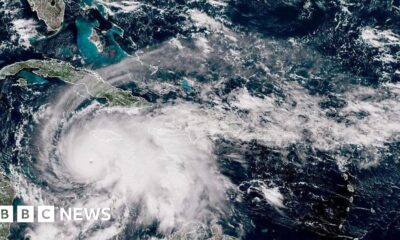Science
Tropical Fish Adapt to New Environments with Local Species

Scientists have discovered that tropical fish migrating to temperate oceans due to increasing ocean temperatures are thriving better when they associate with local species. This finding highlights the importance of social learning in new environments, particularly as climate change continues to reshape marine ecosystems.
Research conducted by a team of marine biologists focused on how tropical fish, previously confined to warmer waters, adapt to their new habitats. The study emphasizes that these fish learn vital survival behaviors from native species, enhancing their chances of thriving in unfamiliar territories.
Social Learning Plays a Key Role
The research, published in the journal *Ecology Letters*, highlights the significance of social interactions among fish. By observing and interacting with local species, tropical fish can acquire essential skills, such as foraging techniques and predator avoidance strategies. This process of social learning is particularly crucial as fish face the challenges posed by rapidly changing ocean conditions.
The study examined various tropical fish species that have expanded their ranges into temperate waters, driven by global warming. Researchers observed how these fish formed mixed-species shoals with native fish. These interactions led to improved survival rates compared to those fish that remained isolated from local populations.
Strong evidence from the research indicates that fish that engage with local species are more adept at adapting to their new environments. For instance, tropical species that learned from temperate neighbors demonstrated better foraging efficiency, which is vital for their survival in the wild.
Implications for Marine Conservation
These findings carry significant implications for marine conservation efforts. As ocean temperatures rise, the movement of tropical fish into temperate regions could alter existing marine ecosystems. Understanding how these interactions influence fish behavior and survival can inform strategies to support biodiversity and ecosystem health.
Researchers stress the need for continued monitoring of these shifts in fish populations. By recognizing the patterns of migration and adaptation, conservationists can develop more effective management practices to protect both tropical and native species in changing environments.
This research not only sheds light on the resilience of tropical fish but also emphasizes the interconnectedness of marine ecosystems. As climate change progresses, the ability of species to adapt through social learning could be a crucial factor in their survival.
With the ongoing impact of global warming, the findings underscore the urgency of addressing climate change and its effects on marine life. Collaborative efforts between scientists, policymakers, and conservationists will be essential in navigating the challenges ahead for our oceans.
-

 Entertainment3 months ago
Entertainment3 months agoAnn Ming Reflects on ITV’s ‘I Fought the Law’ Drama
-

 Entertainment4 months ago
Entertainment4 months agoKate Garraway Sells £2 Million Home Amid Financial Struggles
-

 Health3 months ago
Health3 months agoKatie Price Faces New Health Concerns After Cancer Symptoms Resurface
-

 Entertainment3 months ago
Entertainment3 months agoCoronation Street’s Carl Webster Faces Trouble with New Affairs
-

 Entertainment3 months ago
Entertainment3 months agoWhere is Tinder Swindler Simon Leviev? Latest Updates Revealed
-

 Entertainment2 weeks ago
Entertainment2 weeks agoCoronation Street Fans React as Todd Faces Heartbreaking Choice
-

 World2 weeks ago
World2 weeks agoBailey Announces Heartbreaking Split from Rebecca After Reunion
-

 Entertainment4 months ago
Entertainment4 months agoMarkiplier Addresses AI Controversy During Livestream Response
-

 Science1 month ago
Science1 month agoBrian Cox Addresses Claims of Alien Probe in 3I/ATLAS Discovery
-

 Health5 months ago
Health5 months agoCarol Vorderman Reflects on Health Scare and Family Support
-

 Entertainment4 months ago
Entertainment4 months agoKim Cattrall Posts Cryptic Message After HBO’s Sequel Cancellation
-

 Entertainment3 months ago
Entertainment3 months agoOlivia Attwood Opens Up About Fallout with Former Best Friend





















